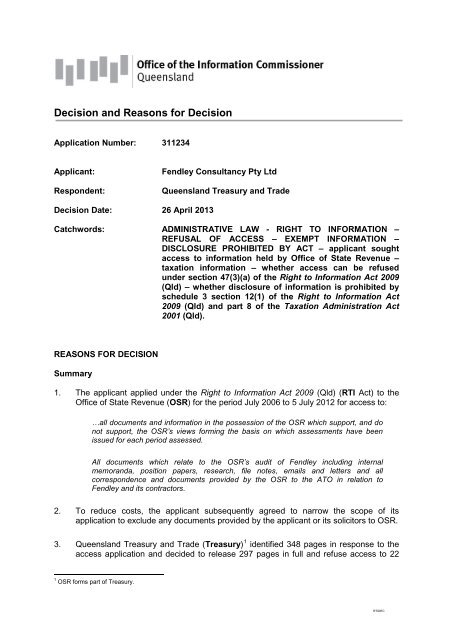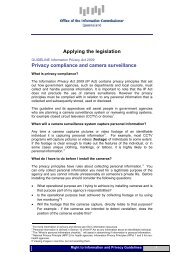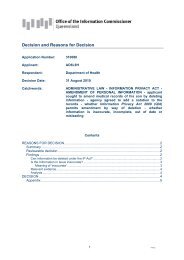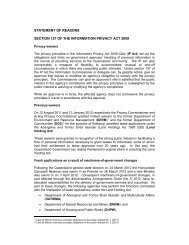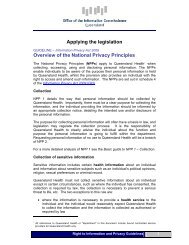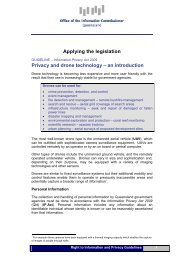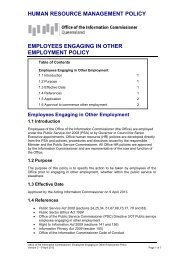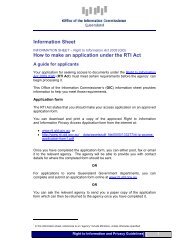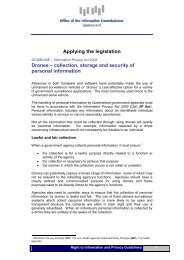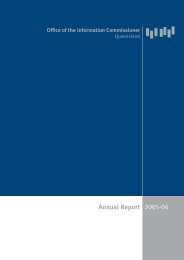Fendley Consultancy Pty Ltd and Queensland Treasury and Trade
Fendley Consultancy Pty Ltd and Queensland Treasury and Trade
Fendley Consultancy Pty Ltd and Queensland Treasury and Trade
Create successful ePaper yourself
Turn your PDF publications into a flip-book with our unique Google optimized e-Paper software.
Decision <strong>and</strong> Reasons for Decision<br />
Application Number: 311234<br />
Applicant:<br />
Respondent:<br />
<strong>Fendley</strong> <strong>Consultancy</strong> <strong>Pty</strong> <strong>Ltd</strong><br />
Queensl<strong>and</strong> <strong>Treasury</strong> <strong>and</strong> <strong>Trade</strong><br />
Decision Date: 26 April 2013<br />
Catchwords: ADMINISTRATIVE LAW - RIGHT TO INFORMATION –<br />
REFUSAL OF ACCESS – EXEMPT INFORMATION –<br />
DISCLOSURE PROHIBITED BY ACT – applicant sought<br />
access to information held by Office of State Revenue –<br />
taxation information – whether access can be refused<br />
under section 47(3)(a) of the Right to Information Act 2009<br />
(Qld) – whether disclosure of information is prohibited by<br />
schedule 3 section 12(1) of the Right to Information Act<br />
2009 (Qld) <strong>and</strong> part 8 of the Taxation Administration Act<br />
2001 (Qld).<br />
REASONS FOR DECISION<br />
Summary<br />
1. The applicant applied under the Right to Information Act 2009 (Qld) (RTI Act) to the<br />
Office of State Revenue (OSR) for the period July 2006 to 5 July 2012 for access to:<br />
…all documents <strong>and</strong> information in the possession of the OSR which support, <strong>and</strong> do<br />
not support, the OSR’s views forming the basis on which assessments have been<br />
issued for each period assessed.<br />
All documents which relate to the OSR’s audit of <strong>Fendley</strong> including internal<br />
memor<strong>and</strong>a, position papers, research, file notes, emails <strong>and</strong> letters <strong>and</strong> all<br />
correspondence <strong>and</strong> documents provided by the OSR to the ATO in relation to<br />
<strong>Fendley</strong> <strong>and</strong> its contractors.<br />
2. To reduce costs, the applicant subsequently agreed to narrow the scope of its<br />
application to exclude any documents provided by the applicant or its solicitors to OSR.<br />
3. Queensl<strong>and</strong> <strong>Treasury</strong> <strong>and</strong> <strong>Trade</strong> (<strong>Treasury</strong>) 1 identified 348 pages in response to the<br />
access application <strong>and</strong> decided to release 297 pages in full <strong>and</strong> refuse access to 22<br />
1 OSR forms part of <strong>Treasury</strong>.<br />
RTIDEC
Office of the Information Commissioner (Qld) – 311234 - Page 2 of 7<br />
pages in full <strong>and</strong> 29 pages in part on the grounds that disclosure of the documents<br />
would, on balance, be contrary to the public interest (Information in Issue).<br />
4. The applicant applied to the Office of the Information Commissioner (OIC) for external<br />
review of <strong>Treasury</strong>’s decision.<br />
5. <strong>Treasury</strong>’s decision is varied <strong>and</strong> access to the Information in Issue is refused on the<br />
basis that it comprises exempt information as its disclosure is prohibited by part 8 of<br />
the Taxation Administration Act 2001 (TA Act).<br />
6. Significant procedural steps relating to the application are set out in the appendix to<br />
this decision.<br />
Reviewable decision<br />
7. The decision under review is <strong>Treasury</strong>’s decision dated 3 October 2012.<br />
Evidence considered<br />
8. The evidence, submissions, legislation <strong>and</strong> other material I have considered in<br />
reaching this decision are disclosed in these reasons (including footnotes <strong>and</strong><br />
appendix).<br />
Information in issue<br />
9. The information in issue is the information identified at paragraph 3 above.<br />
Relevant law<br />
10. Access must be given to a document unless disclosure would, on balance, be contrary<br />
to the public interest. 2 Schedule 3 of the RTI Act sets out information which Parliament<br />
considers is exempt from disclosure on the basis that disclosure would, on balance, be<br />
contrary to the public interest. 3 Schedule 3, section 12(1) of the RTI Act provides that<br />
information is exempt if its disclosure is prohibited by a number of listed provisions,<br />
including:<br />
Taxation Administration Act 2001, part 8, so far as it applies to personal confidential<br />
information under that Act.<br />
11. The main purpose of the TA Act is to make general provision about the administration<br />
<strong>and</strong> enforcement of revenue laws. 4 Part 8 of the TA Act relates to confidentiality of<br />
information. Relevantly, section 111(1) of the TA Act provides that an official 5 must not<br />
disclose confidential information acquired by the official in the official’s capacity to<br />
anyone else other than under part 8 of the TA Act.<br />
12. Schedule 2 of the TA Act sets out the following definitions used in part 8 of the TA Act:<br />
confidential information means information disclosed to, obtained by, or otherwise held<br />
by, an official under or in relation to a tax law.<br />
2 Sections 44(1) <strong>and</strong> 48(1) of the RTI Act.<br />
3 See also section 48(2) of the RTI Act.<br />
4 Section 3(1) of the TA Act.<br />
5 Defined in schedule 2 of the TA Act as ‘a person who is, or has been a public service employee or other person, performing<br />
functions under or in relation to the administration or enforcement of a tax law.’<br />
RTIDEC
Office of the Information Commissioner (Qld) – 311234 - Page 3 of 7<br />
personal confidential information, for a person, means confidential information that—<br />
(a) identifies, or is likely to identify, the person; or<br />
(b) discloses matters about the person’s affairs.<br />
13. To be exempt under schedule 3, section 12 of the RTI Act, the Information in Issue<br />
must:<br />
(a) be ‘personal confidential information’ as defined in schedule 2 of the TA Act<br />
(b) be prohibited from disclosure under part 8 of the TA Act; <strong>and</strong><br />
(c) not be subject to the exception listed in schedule 3, section 12(2) of the RTI Act.<br />
14. Schedule 3, section 12(2) of the RTA provides that information is not exempt<br />
information under subsection (1) in relation to an access application, if it is personal<br />
information for the applicant.<br />
Findings<br />
Is <strong>Treasury</strong> entitled to refuse access to the Information in Issue?<br />
15. Yes, for the reasons that follow.<br />
Application of part 8 of the TA Act<br />
Is the Information in Issue ‘personal confidential information’?<br />
16. Yes. I am satisfied that the Information in Issue comprises information disclosed to,<br />
obtained by or otherwise held by officials within the department under, or in relation to<br />
a tax law <strong>and</strong> is therefore ‘confidential information’ for the purposes of the TA Act.<br />
17. I am also satisfied that the Information in Issue:<br />
• identifies or is likely to identify persons—both individuals <strong>and</strong> corporations; <strong>and</strong>/or<br />
• discloses matters about the affairs of those persons, such as their financial,<br />
taxation <strong>and</strong> business affairs.<br />
18. The Acts Interpretation Act 1954 (Qld) (AI Act) provides that the term ‘person’ includes<br />
an individual <strong>and</strong> a corporation. 6 The AI Act further provides that it applies to all Acts 7<br />
<strong>and</strong> that its operation may be displaced, wholly or partly, by a contrary intention<br />
appearing in any Act. 8 The operation of the relevant provisions of the AI Act has not<br />
been expressly displaced for the purposes of the definition of ‘personal confidential<br />
information’, nor is there any contrary intention in the provisions of the TA Act.<br />
19. Accordingly, I am satisfied that the Information in Issue is ‘personal confidential<br />
information’ for the purposes of Part 8 of the TA Act.<br />
Does part 8 of the TA Act prohibit disclosure?<br />
20. Yes. Section 111(1) of the TA Act prohibits an official from disclosing confidential<br />
information acquired by the official in the official’s capacity other than under part 8.<br />
6 Sections 36 <strong>and</strong> 32D(1) of the AI Act.<br />
7 Section 2 of the AI Act.<br />
8 Section 4 of the AI Act.<br />
RTIDEC
Office of the Information Commissioner (Qld) – 311234 - Page 4 of 7<br />
21. I am satisfied that the Information in Issue was acquired by OSR officials in their official<br />
capacity.<br />
22. The Commissioner of State Revenue has the discretion to disclose confidential<br />
information under the TA Act in specified circumstances, as set out in<br />
sections 111(2)-(4) of the TA Act. However, there is no provision under the TA Act or<br />
the RTI Act which allows the Information Commissioner to exercise this discretion on<br />
behalf of the Commissioner of State Revenue.<br />
23. I am therefore satisfied that disclosure of the Information in Issue is prohibited by part 8<br />
of the TA Act.<br />
Application of schedule 3, section 12 of the RTI Act<br />
Does the exception in schedule 3, section 12(2) of the RTI Act apply?<br />
24. No. Schedule 3, section 12(2) of the RTI Act permits disclosure of otherwise exempt<br />
information, if the information is personal information for the applicant.<br />
25. Personal information is defined in section 12 of the Information Privacy Act 2009 (Qld) 9<br />
(IP Act) as follows:<br />
information or an opinion, including information or an opinion forming part of a database,<br />
whether true or not, <strong>and</strong> whether recorded in a material form or not, about an individual<br />
whose identity is apparent, or can reasonably be ascertained, from the information or<br />
opinion.<br />
[emphasis added]<br />
26. Section 36 of the AI Act provides that the term ‘individual’ means a natural person.<br />
27. Although the applicant accepts, without having seen the Information in Issue, that the<br />
Information in Issue is likely to be its ‘personal confidential information’ for the purposes<br />
of the TA Act, the applicant submits that:<br />
• schedule 3, section 12(2) of the RTI Act cannot be intended to allow natural<br />
persons access to their own ‘personal confidential information’, while denying<br />
corporations <strong>and</strong> other entities access to their ‘personal confidential information’<br />
• the intention of the exception in schedule 3, section 12(2) of the RTI Act is to allow<br />
applicants access to their own ‘personal confidential information’<br />
• that intention is sufficient to displace the definition of ‘individual’ in section 36 of the<br />
AI Act 10<br />
• therefore the term ‘individual’ contained in the definition of ‘personal information’<br />
should be construed as meaning any applicant, including a corporation; <strong>and</strong><br />
• therefore the Information in Issue is ‘personal information’ for the applicant <strong>and</strong><br />
accordingly the exception in schedule 3, section 12(2) of the RTI Act should apply<br />
to the Information in Issue.<br />
28. In Davis v City North Infrastructure <strong>Pty</strong> <strong>Ltd</strong> 11 (Davis v CNI) Applegarth J considered the<br />
statutory interpretation of section 16(1)(a) of the RTI Act. In that decision, Applegarth J<br />
stated that the general principles of statutory interpretation that applied were:<br />
9 Schedule 6 of the RTI Act adopts this definition.<br />
10 Pursuant to sections 4 <strong>and</strong> 32A of the AI Act.<br />
11 [2012] 2 Qd R 103.<br />
RTIDEC
Office of the Information Commissioner (Qld) – 311234 - Page 5 of 7<br />
• the principle set out in Project Blue Sky Inc v Australian Broadcasting<br />
Authority 12 that a statutory provision should be construed so that it is<br />
consistent with the language <strong>and</strong> purpose of all of the provisions of a statute;<br />
<strong>and</strong><br />
• the principle set out in section 14A of the AI Act, which provides that in the<br />
interpretation of a provision of an Act, an interpretation that will best achieve<br />
the purpose of the Act is to be preferred to any other interpretation.<br />
29. The object of the RTI Act is to give a right of access to information in the government’s<br />
possession or under its control unless, on balance, it is contrary to the public interest to<br />
give access. Reference to the object of the RTI Act is not of particular assistance in<br />
this matter as the RTI Act expressly provides that it is contrary to the public interest to<br />
give access to information if its disclosure is prohibited by part 8 of the TA Act so far as<br />
it applies to personal confidential information under that Act, unless it is personal<br />
information for the applicant.<br />
30. As set out above, personal information is defined in the IP Act as information or opinion<br />
about an individual <strong>and</strong> individual is defined in the AI Act as a natural person.<br />
31. In Saeed v Minister for Immigration <strong>and</strong> Citizenship 13 (Saeed v MIC) the majority of the<br />
High Court found that the ‘presumption is that words are used in a statute for a reason;<br />
they should be given their meaning <strong>and</strong> effect.’ In that case, Heydon J also stated that<br />
an argument that the construction of the Migration Act 1958 (Cth) which leads to<br />
offshore visa applicants having better rights than onshore visa applicants is so absurd<br />
or unreasonable that it cannot be preferred was unconvincing. 14<br />
32. I am not convinced that a construction of schedule 3, section 12 of RTI Act which<br />
allows natural persons access to their own ‘personal confidential information’, while<br />
denying corporations <strong>and</strong> other entities access to their ‘personal confidential<br />
information’ is so ‘absurd or unreasonable’ that the definition of ‘individual’ in section 36<br />
of the AI Act should be displaced.<br />
33. Accordingly, I am satisfied that only individuals can have personal information for the<br />
purpose of the RTI Act. As <strong>Fendley</strong> <strong>Consultancy</strong> <strong>Pty</strong> <strong>Ltd</strong> is a corporation, not a natural<br />
person, the exception in schedule 3, section 12(2) of the RTI Act cannot apply.<br />
Is the Information in Issue exempt from release under schedule 3 section 12(1) of<br />
the RTI Act?<br />
34. Yes. On the basis of the matters set out above, I am satisfied that the Information in<br />
Issue is personal confidential information for the purposes of part 8 of the TA Act, <strong>and</strong><br />
that its disclosure is prohibited by section 111(1) of the TA Act. The Information in<br />
Issue is therefore exempt from disclosure under schedule 3, section 12(1) of the<br />
RTI Act.<br />
35. As the Information in Issue is exempt under schedule 3, section 12(1) of the RTI Act, it<br />
is not necessary to consider the contrary to public interest claim raised by <strong>Treasury</strong>.<br />
12 (1998) 194 CLR 355.<br />
13 (2010) 241 CLR 252 at 266.<br />
14 (2010) 241 CLR 252 at 282<br />
RTIDEC
Office of the Information Commissioner (Qld) – 311234 - Page 6 of 7<br />
DECISION<br />
36. For the reasons set out above, I vary the decision under review <strong>and</strong> find that access<br />
may be refused on the basis that the Information in Issue comprises exempt<br />
information in accordance with schedule 3, section 12 of the RTI Act.<br />
37. I have made this decision as a delegate of the Acting Information Commissioner, under<br />
section 145 of the RTI Act.<br />
________________________<br />
Assistant Information Commissioner Corby<br />
Date: 26 April 2013<br />
RTIDEC
Office of the Information Commissioner (Qld) – 311234 - Page 7 of 7<br />
APPENDIX<br />
Significant procedural steps<br />
Date<br />
Event<br />
5 July 2012 <strong>Treasury</strong> received the applicant’s access application.<br />
25 July 2012 <strong>Treasury</strong> issued a Charges Estimate Notice to the applicant.<br />
16 August 2012 The applicant agreed to narrow the scope of the application to<br />
exclude documents of information provided by the applicant or<br />
their solicitors to the OSR.<br />
20 August 2012 <strong>Treasury</strong> issued a second Charges Estimate Notice to the<br />
applicant.<br />
29 August 2012 The applicant agreed to pay the second Charges Estimate<br />
Notice.<br />
31 August 2012 <strong>Treasury</strong> notified the applicant that it would be necessary to<br />
consult with third parties.<br />
3 October 2012 <strong>Treasury</strong> refused access to the Information in Issue under<br />
section 47(3)(b) of the RTI Act (initial decision).<br />
29 October 2012 The applicant applied to OIC for external review of the initial<br />
decision.<br />
8 November 2012 OIC notified both parties that the applicant’s external review<br />
application had been accepted <strong>and</strong> asked <strong>Treasury</strong> to provide<br />
OIC with a copy of the Information in Issue<br />
16 November 2012 OIC received a copy of the Information in Issue.<br />
22 January 2013 OIC conveyed to the applicant the view that the Information in<br />
Issue comprises exempt information under schedule 3,<br />
section 12 of the RTI Act <strong>and</strong> invited the applicant to make<br />
submissions if they did not agree with the view.<br />
13 February 2013 The applicant advised OIC that they did not accept OIC’s view<br />
<strong>and</strong> provided written submissions.<br />
RTIDEC


